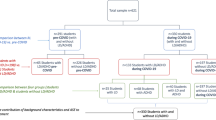Abstract
The impact of a six-week multimodal summer camp program on the self-concept and reading/writing skills of a group of dyslexic students (n=42) was assessed. Campers ranged in age from 9 to 14 years (mean=11 years, 5 months) and came from public, private, and specialized private schools serving students with learning disability (LD). Twenty-six percent of the sample had a comorbid diagnoses of attention deficit disorder (ADD) and 11 percent had attention deficit hyperactivity disorder (ADHD). Campers improved significantly in phonetic reading and spelling skills, but not in sight word vocabulary or reading speed. Campers also exhibited significant improvements in self-concept, both on a general level and in the specific areas of reading and overall academic competence. The kinds of changes observed on the more general measures of self-concept, however, were not the same for the various groups of campers. Campers from regular private schools and from public schools typically experienced greater gains in general self-concept than did campers from LD private schools. Campers with diagnosed comorbid disorders typically realized little or no gains, whereas campers without ADD or ADHD displayed significant improvement in general self-concept.
Similar content being viewed by others
References
Alexander, A. W., Anderson, H. G., Heilman, P. C., Voeller, K. K., and Torgesen, J. K. 1991. Phonological awareness training and remediation of analytic decoding deficits in a group of severe dylexics. Annals of Dyslexia 41:193–206.
Arena, J. 1982. Diagnostic Potential Spelling Test. Novato, CA: Academic Therapy.
Ball, E. W., and Blachman, B. A. 1988. Phoneme segmentation training: Effect on reading readiness. Annals of Dyslexia 38:208–25.
Barkley, R. A. 1997. Behavioral inhibition, sustained attention and executive functions: Constructing a unifying theory of ADHD. Psychological Bulletin 121:65–94.
Conderman, G., Snider, V. E., and Crawford, D. 1997. Establishing high expectations through the LEAP clinic. Intervention in School and Clinic 33(2):98–102.
Felton, R. H. 1993. Effects of instruction on the decoding skills of children with phonological-processing problems. Journal of Learning Disabilities 26:575–82.
Foorman, B. R., Francis, D. J., and Fletcher, J. M. 1997. NICHD early interventions project. Perspectives, International Dyslexia Association 23(4):4–5.
Gillingham, A., and Stillman, B. W. 1997. Gillingham Manual: Remedial Training for Students with Specific Disabilities in Reading, Spelling and Penmanship. Cambridge, MA: Educators Publishing Service.
Greene, J. F. 1993. Systematic phonology: Critical element in teaching, reading and language to dyslexics. In S. F. Wright and R. Groner, ed., Facets of Dyslexia and Its Remediation. Amsterdam: Elsevier Science Publishers.
Greene, J. F. 1996. Language!: Effects of an individualized structured language curriculum for middle and high school students. Annals of Dyslexia 46:97–121.
Harter, S. 1986. Processes underlying the construct, maintenance, and enhancement of self-concept in children. In J. Suls and A. Greenwald, eds., Psychological Perspectives on the Self. Hilldale, NJ: Lawrence Earlbaum Associates, 137–81.
Harter, S. 1990. Issues in the assessment of the self-concept of children and adolescents. In A. M. LaGreca, ed., Through the Eyes of the Child. Boston: Allyn and Bacon, 292–325.
King, D. H. 1989. Writing Skills 1 and 2. Cambridge, MA: Educators Publishing Service.
Lyon, G. R. 1995. Research initiatives in learning disabilities. Journal of Child Neurology 10(1):120–26.
Marsh, H. W. 1990. Self Description Questionnaire-I Manual. MacArthur, Australia: University of Western Sydney.
Marsh, H. W. 1994. Using the National Longitudinal Study of 1988 to evaluate theoretical models of self-concept: The Self Description Questionnaire. Journal of Educational Psychology 86:439–56.
Marsh, H. W., Barnes, J., Cairns, L., and Tidman, M. 1984. The Self Description Questionnaire (SDQ): Age effects in the structure and level of self-concept for preadolescent children. Journal of Educational Psychology 76:940–56.
Marsh, H. W., Smith, I. D., and Barnes, J. 1985. Multidimensional self-concepts: Relationships with sex and academic achievement. Journal of Educational Psychology 77:581–96.
McGuinness, C., McGuinness, D., and McGuinness, G. 1996. Phono-graphix: A new method for remediating reading difficulties. Annals of Dyslexia 46:73–96.
Meece, J. L., Parsons, J. E., Kaczala, C. M., Golf, S. B., and Futterman, R. 1982. Sex differences in math achievement: Toward a model of academic choice. Psychological Bulletin 91:324–48.
Relich, J. D. 1983. Attribution, affective variables, and arithmetic achievement. Ph.D. class. University of Sydney, Australia.
Rosenberg, M. 1979. Conceiving the Self. New York: Basic Books.
Shavelson, R. J., Hubner, J. J., and Stanton, G. C. 1976. Validation of construct interpretations. Review of Educational Research 46:407–41.
Torgesen, J. K., and Davis, C. 1996. Individual difference variables that predict response to training in phonological awareness. Journal of Experimental Child Psychology 63:1–21.
Torgesen, J. K., Rashotte, C. A., and Wagner, R. K. 1997. Research on instructional interventions for children with reading disabilities. Paper read at Annual Meeting of the International Dyslexia Association, November 1997, Minneapolis.
Wagner, R. K., Torgensen, J. K., and Rashotte, C. 1993. The efficacy of phonological awareness training for early reading achievement: A meta analysis. Symposium presentation at annual meeting of American Education Research Association, April 1993, Atlanta.
Wiederholt, J. L., and Bryant, B. R. 1992. Gray Oral Reading Tests. (3rd Ed.). Austin, Texas: PRO-ED.
Wilson, B. 1988. The Wilson Reading System. Hopedale, MA: Educomp Publications.
Woodcock, R. W. 1989. Woodcock Johnson-Revised, Tests of Achievement. Banning, CA: Riverside Publishing Company.
Author information
Authors and Affiliations
Corresponding author
Rights and permissions
About this article
Cite this article
Van Westervelt, D., Johnson, D.C., Westervelt, M.D. et al. Changes in self-concept and academic skills during a multimodal summer camp program. Ann. of Dyslexia 48, 189–212 (1998). https://doi.org/10.1007/s11881-998-0009-2
Issue Date:
DOI: https://doi.org/10.1007/s11881-998-0009-2




